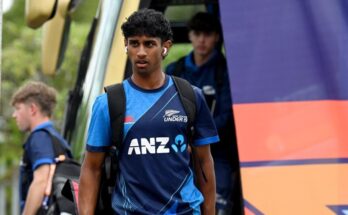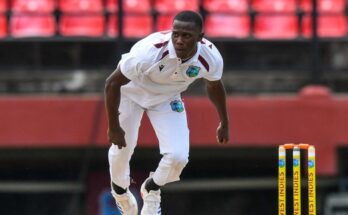Jonathan Liew’s piece on Eoin Morgan, who announced his retirement in 2022, originally appeared in the 2023 edition of Wisden Cricketer’s Almanack.
The end came on a dry and breezy Monday morning. Eoin Morgan sat up in bed, felt the twinges of battle in his back, joints and groin, an overwhelming tiredness, and ennui in his soul – and knew what it all meant. He had spoken to countless colleagues and friends about this moment. “There’s a time and place when it hits you,” he said later. For England’s greatest white-ball captain, that was June 20 at the Fashion Hotel in Amsterdam.
The ability to plan his own departure was a luxury not enjoyed by all of his predecessors. Adam Holooake was sacked just before the 1999 World Cup. Stuart Broad’s removal as Twenty20 captain was hardly announced and England simply stopped selecting him. And Alastair Cook was distraught when he was sacked at the end of 2014, just before the World Cup.
This was the moment international selection committee member James Whittaker picked up the phone to appoint Cooke’s successor. There was no answer. Whittaker kept calling. The last time Morgan looked at his phone, he found about 20 missed calls. It was probably the last time in his England career that he was taken by surprise.
Actually, to call him England’s best white-ball captain is to curse him with scandalously faint praise. It’s like calling Buddha a great Buddhist. Morgan didn’t just take the job. He reinvented it, reinvented it, molded it into something new, gave it his own shape and purpose. He was not England’s first professional leader to specialize in a limited task, but he regarded it as a goal and a privilege in its own right, rather than as an entrance or an accompaniment to something more important. He was the first person to take on this mission.
His seven-and-a-half years and 198 matches represent the longest continuous tenure in English men’s cricket. Longevity isn’t Morgan’s most famous trait, but perhaps it should be. He persevered through a period of unprecedented change at home and abroad, including a dire schedule, cultural and tactical changes, multiple coaching changes, and a pandemic. If he had not done more, his place in history would have already been secured.
He did more than that. He turned a losing team into a winning dynasty. Excluding incomplete games, he won 65 percent of his one-day international matches as captain, the sixth-highest rate of any player with more than 50 games in charge, ahead of Richards, This is a better winning percentage than Waugh, Dhoni and McCullum. But it is perhaps for one draw that he is best known. It’s the 2019 World Cup final against New Zealand. He contributed little with the bat and nothing with the ball, but he still felt like the dominant presence, the center of Zen, the center of composure in one of the most dramatic games of all time. I felt like I was in a vortex.
The sheer arbitrariness of this final, the deflection of Ben Stokes’ bat in a noisy super over, belies Morgan’s extensive achievements as a brilliant strategist and meticulous planner. Equally, you get the sense that he knew enough about the randomness of short-form cricket to understand that things could easily have turned out differently. It was considered worthy and his decision was considered correct. This equanimity, his tolerance for mistakes and misfortunes, the knowledge that despite his best efforts he could still lose, was one of his greatest strengths. It was a trait that allowed him to withstand frequent batting slumps that would have destroyed a less resilient player. In fact, one of the world’s most famous short-form batsmen was never able to fulfill his potential in his domestic T20s. He did not score in his 100, and in his 11-year outing with his team he won only 3 out of 32 titles.
However, his greatness cannot be measured only by number of games, time, winning percentage, or trophies. Rather, it was the sounds and the sounds, the atmosphere and the moments, the feeling that a miracle was about to happen, the warmth and strength of a team that grew together, fought together, and embody the best of these islands. That’s why when Morgan was asked to name his favorite memory as captain, he didn’t point to the World Cup final or any specific game or performance. Instead, he chose emotion. It’s a glimmer of hope and possibility in the early summer of 2015, when a new captain and new players excitedly reach the limits of their potential.
That was the beginning of the journey. As the movie says, the real world championship may have been the friends made along the way. Morgan’s Britain would be based on friendship, honesty and trust. The selection was reasonable and consistent. The players were selected not only for their skills, but also for their character. Failure was acceptable. It wasn’t alarmism or arrogance. Statistics and data are seamlessly combined, always available, and never prescriptive. A formula emerged: left-arm seam at the top, spin in the middle, yorker at the end, and aggressive fielding and batting throughout. And yet, there was an emphasis on diversity. 360 degrees of stroke play, deft changes of pace and flight, and subtly different challenges presented by each bowler.
For Morgan, this heresy has long been deeply rooted. From the moment he carried his equipment across the Irish Sea, he became an outsider entering the system, but never truly becoming part of it. As a batsman he was very innovative and had a repertoire of batting and solid shots rarely seen in English cricket. It remains a great misfortune that he only played 16 Tests: Morgan grew up with one of the richest generations in the history of England’s batting lineup. Now he would have had several chances to solve technical problems.
However, the red ball’s loss was the white ball’s gain. In any case, Morgan didn’t seem too sad about the end of his Test career, nor did he seem to accept the consensus that it was the only legacy that mattered. He was, and always has been, his own man, unafraid of the court of public opinion. As a result, he was sometimes targeted. He was an early example of not singing the national anthem. The other option was because most of his colleagues had given up on visiting Bangladesh. The same goes for Alex Hales, who took drugs recreationally on the eve of the 2019 World Cup and then refused to return his calls. Relinquishing the captaincy during the series in the Netherlands felt like a final act of self-expression, a decision determined to maintain a “real sense of ownership”.
Was Morgan too strong? Has the system finally become the ultimate system destroyer? In his later years, especially since 2019, a strangely impregnable aura has surrounded him, Respect was often observed not only from players but also from coaches and superiors. Words just came out of his mouth and turned into wisdom. His outspoken support for The Hundred, often expressed through insidious contempt for county conferences, was sincere but eerily similar to what a paid ECB spokesperson would say. . Meanwhile, his reputation as a champion of diversity and racial justice was widened by his comment “Allah was with us” in a press conference after the World Cup final.
On the other hand, if anyone is going to make English cricket a fiefdom, it should be him. For a fiercely competitive man who has lived in the cauldron of cricket’s elite for more than a decade, with no enemies, no real feuds, no unfinished business, except in the case of Hales. I left, but no one was ready for it. I say bad things about him. That was Morgan’s true talent. It’s his ability to bring people closer, to issue commands in a way that feels empowering, to create intimacy and camaraderie amid the ruthless work, even if he remains spectacularly elusive.
England has had many great captains over the years, from Brearley to Hussain, Jardine to Vaughan, Heyhoe Flint to Knight. But all were stewards in their own ways, leaders meant to inherit, renew, and bequeath. Morgan has no heritage or lineage. He bequeathed a strategy and a blueprint to Jos Buttler, but also bequeathed a team that energetically incorporated his image to play a game that was slowly losing its relevance.
Will international T20 still be around in eight years? Can over-50s cricket survive beyond the high-profile tournament? In short, if England’s captain is as good as Morgan, Is it possible to build one from scratch? Great leaders come and go. Great moments are special. There may be others. But somehow the next one will never exist.
Jonathan Liu is a sports journalist atThe Guardian.



